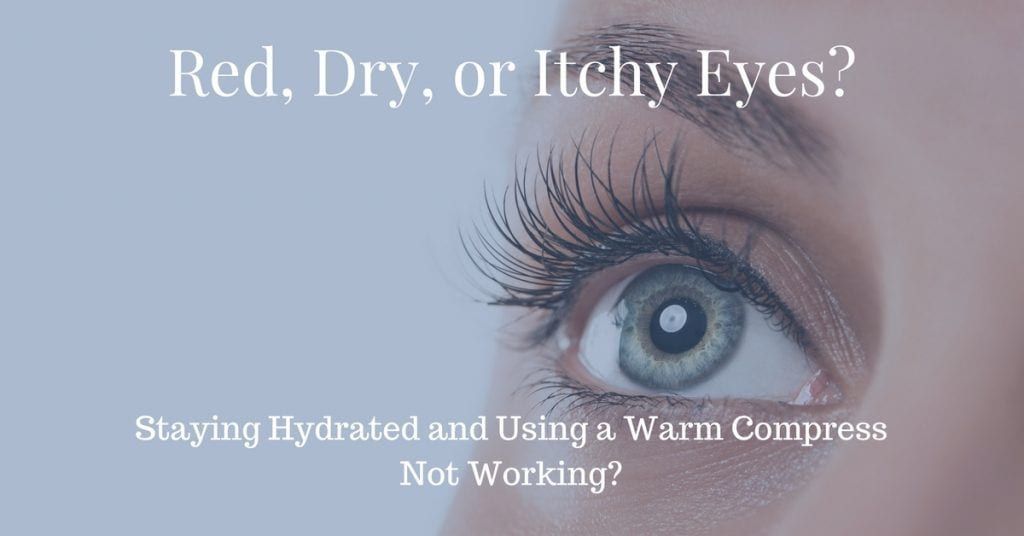
Do you suffer from red, dry, or itchy eyes? Are your eyes sensitive to light and easily fatigued? If you are affected by dry eye syndrome, you are not alone. In fact, the American Academy of Optometry estimates that over 3 million women and nearly 2 million men over the age of 50 suffer from dry eye syndrome. The American Academy of Optometry also notes that the occurrence of Dry eye syndrome increases with age. Because dry eye syndrome is so prevalent, there are many common remedies and over the counter options that can treat dry eye symptoms. However, sometimes common remedies may be inadequate. The following remedies may not be enough for your dry eyes!
Staying Hydrated
Dehydration affects nearly every system in your body, and your eyes are no exception. Because dehydration can be a significant cause of dry eyes, it is vital to consistently drink at least eight glasses of water per day. However, if you regularly consume your daily dose of water but still wake up with dry or burning eyes, this is a sign that hydration alone is no longer sufficient a remedy for dry eyes.
A Healthy Diet Rich in Omega-3 Fatty Acids
Dry Eye is caused by inflammation. Inflamed eyes either have low-quality tears or a lack of tears altogether. Because omega-3 fatty acids reduce inflammation throughout the entire body, a diet rich in omega-3 fatty acids also helps to reduce eye inflammation and therefore improve symptoms of dry eye syndrome. Omega-3 fatty acids can be added to your diet through a supplement or foods such as fatty fish like salmon, chia seeds, flax seeds, walnuts, olive oil, and omega-3 fortified eggs.
However, if you consume the daily recommended intake of omega-3 fatty acids either through food or supplements, but you do not have a reprieve from dry eye syndrome symptoms, then this common remedy is insufficient. Anti-inflammatory treatments that directly treat the eye may be needed.
Cyclosporine (Restasis)
Restasis is a prescription eye drop medication that is often confused with artificial tears. While over-the-counter artificial tears can provide temporary relief from dryness, Restasis increases your eyes’ ability to produce their tears by decreasing inflammation in your eyes. However, you may find that Restasis reduces your eye inflammation but does not completely control your dry eye symptoms, you may find that your eyes may remain red or even slightly dry. If this occurs, it is a sign that you need to supplement your Restasis.
Humidifiers
As anyone who has ever sat around a campfire can tell you, dry air can quickly dry out your eyes. Especially in the dry winter air, dry eye symptoms can be intensified by furnaces and fireplaces blowing out hot air. Humidifiers are very effective at increasing the moisture levels in a room. With the advanced models that are available today, they are not only effective, but they also work fast. As a humidifier increases the moisture level of the air in a room, the moist air should help your dry eye symptoms. However, if your humidifier is working correctly but you are still experiencing dry eyes and a lack of tear production, then this common remedy is insufficient.
Washing Your Eyelids and Using a Warm Compress
Washing your eyelids and using a warm compress can be an effective remedy for dry eyes. Furthermore, washing your eyelids with a mild cleanser such as baby shampoo may improve the hygiene of the eyelids. However, if these remedies have previously worked for you but no longer bring you comfort, then these common remedies may be insufficient as it does not manage the underlying cause.
When These Remedies Don’t Provide Enough Relief, Patients Need a More Comprehensive, Targeted Treatment Such as IPL
The aforementioned common remedies (hydration, a diet rich in omega 3-fatty acids, Restasis, humidifier usage, and washing eyelids in conjunction with warm compresses) are all remedies that manage of dry eye. If these remedies have ceased to eliminate any or all of the symptoms of your dry eye syndrome, it may be time to schedule an appointment with your doctor.
Click here to learn which questions to ask yourself and your doctor before making an appointment.
If, at any time, you experience moderate to severe eye pain or eye discharge, call your eye doctor as soon as possible.


